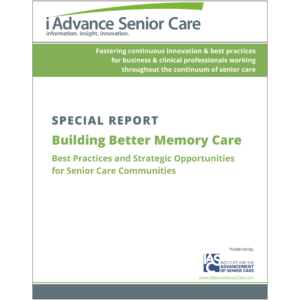Staff affect emotions of those with Alzheimer’s, study confirms
The actions of staff and family members can have a profound influence—good and bad—on the emotional state of those with Alzheimer's disease, confirms a new study out of the University of Iowa (UI).
Those who have the disease may not remember a recent visit by a loved one or having been neglected by staff at a nursing home, but those actions can have a lasting effect on how they feel, the researchers say. Their findings are published in a freely available article in the September issue of Cognitive and Behavioral Neurology.
When UI researchers showed study participants with Alzheimer's disease clips of sad and happy movies, they experienced sustained states of sadness and happiness despite not being able to remember the movies. In fact, the less those with Alzheimer’s remembered about the films, the longer their sadness lasted. Although sadness tended to last a little longer than happiness, both emotions far outlasted the memory of the films.
“This confirms that the emotional life of an Alzheimer’s patient is alive and well,” says lead author Edmarie Guzmán-Vélez, a doctoral student in clinical psychology, a dean's graduate research fellow and a National Science Foundation graduate research fellow.
The fact that forgotten events can continue to exert a profound influence on a resident’s emotional life highlights the need for caregivers to avoid causing negative feelings and to try to induce positive feelings, the researchers say.
“Our findings should empower caregivers by showing them that their actions toward patients really do matter,” Guzmán-Vélez says. “Frequent visits and social interactions, exercise, music, dance, jokes and serving patients their favorite foods are all simple things that can have a lasting emotional impact on a patient’s quality of life and subjective well-being.”
Guzmán-Vélez conducted the study with Daniel Tranel, PhD, a UI professor of neurology and psychology, and Justin Feinstein, PhD, an assistant professor at the University of Tulsa and the Laureate Institute for Brain Research. Tranel and Feinstein published a paper in 2010 that predicted the importance of attending to the emotional needs of people with Alzheimer’s disease.
“It’s extremely important to see data that support our previous prediction,” Tranel says. “Edmarie’s research has immediate implications for how we treat patients and how we teach caregivers” techniques to improve well-being and minimize suffering.
I Advance Senior Care is the industry-leading source for practical, in-depth, business-building, and resident care information for owners, executives, administrators, and directors of nursing at assisted living communities, skilled nursing facilities, post-acute facilities, and continuing care retirement communities. The I Advance Senior Care editorial team and industry experts provide market analysis, strategic direction, policy commentary, clinical best-practices, business management, and technology breakthroughs.
I Advance Senior Care is part of the Institute for the Advancement of Senior Care and published by Plain-English Health Care.
Related Articles
Topics: Alzheimer's/Dementia











